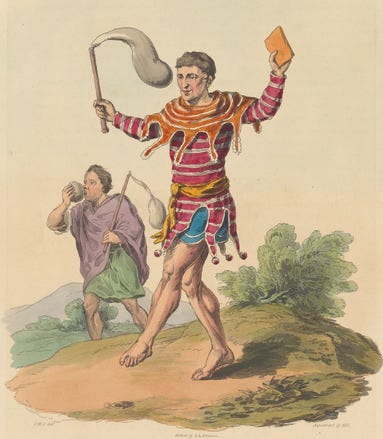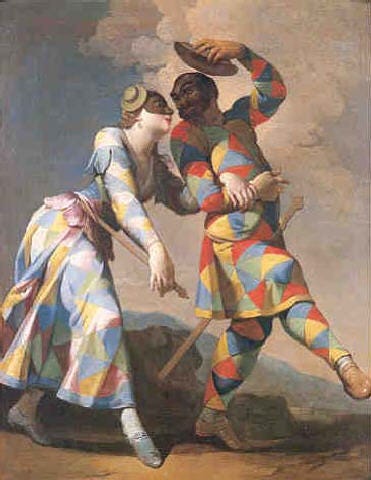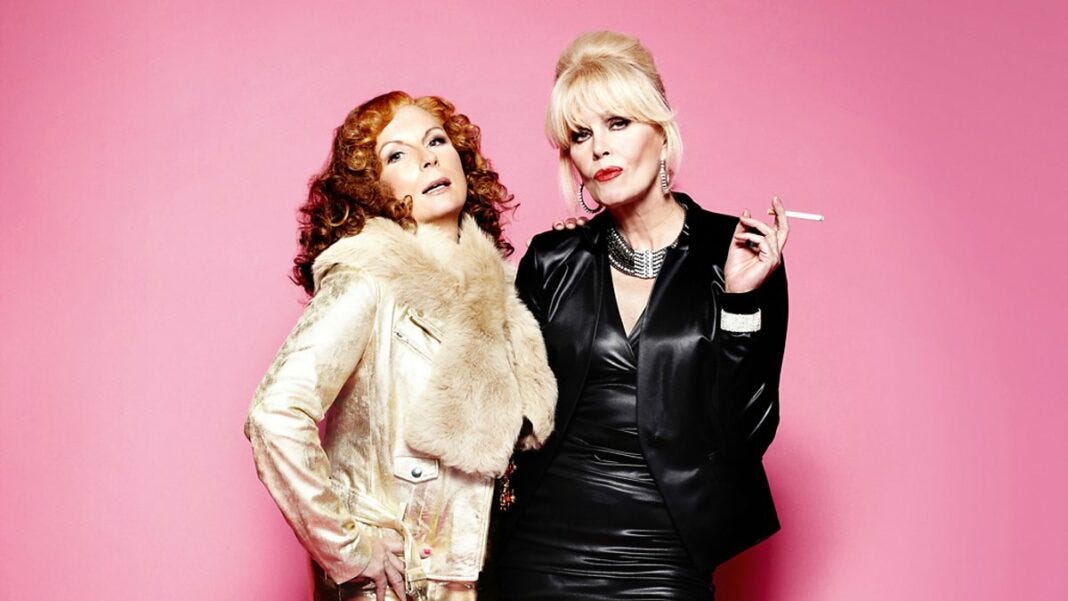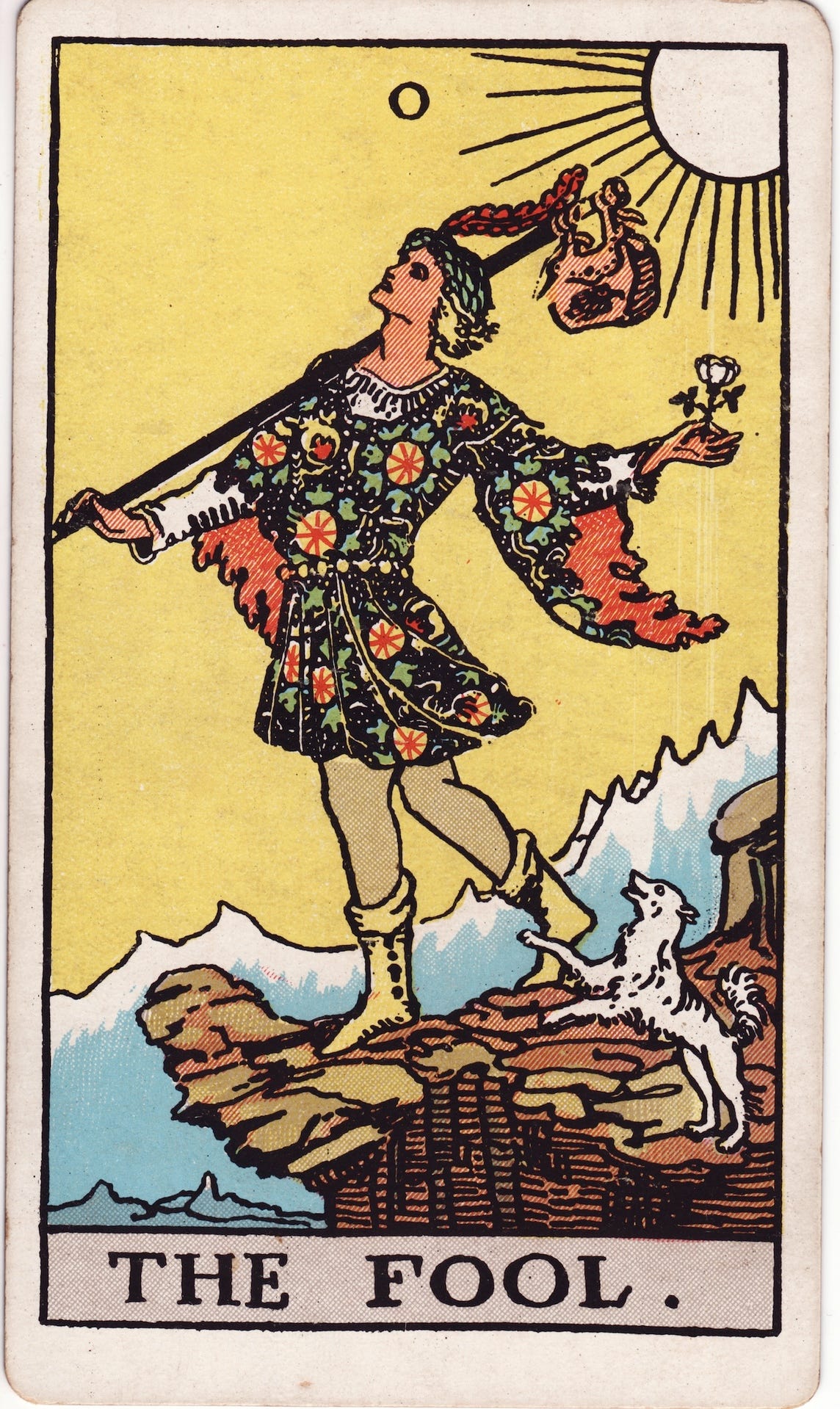fools
inhale, reimagine, and leap
Dear word explorer,
Recently I’ve been pondering the concept of The Fool, being foolish, and its association with both naïve optimism and blind ignorance.
As usual, I love a gander at the etymology: it was first recorded in 1225–75 in the Middle English fol or fool, which came from the Old French fol, via the Latin follis ‘bellows, bag.’
No doubt there’s an element of ‘hot air’ in its association, but the fool is often depicted carrying a bag or a balloon (often an inflated pig’s bladder) at the end of a stick. Note this 19th century illustration, with the dancing fool in merry clothing holding such a implement.
This stock character, who is given license1 to be rude and boundary-breaking, has ancient origins in the Old Comedy period in Greece — approximately 5th Century BCE — and best exemplified by Aristophanes. Greek comedies were boisterous works which included snarky satire of current events and notable public figures, and involved theatrics, music and fooling. As it typical with drama of the era, all the characters were masked. This concealed identity, using disguises, masks or face-paint, is an inherent part of the comedy tradition. The exaggeration of fools, and their outrageous stunts, is aided by their appearance and trappings. Their antics are fantastical and unreal, playing with and against convention. In their ploys and ruses they often point out the fabrications and hypocrisies of society.
The Greek comedies were originally staged in Athens as part of the annual five-day festival of theatre in honour of Dionysus, the god of wine, vegetation, fertility, and delirium. I’ve mentioned Dionysus in my newsletter before, in Flights of Fancy, and it’s appropriate that he’s associated with the wild larks of comedy.
A fool can speak the truth to people in power that might land an ordinary citizen in prison (although, that’s little protection against humourless despots). In The Knights (424 BCE), Aristophanes’ critique of Athens during the Peloponnesian War, one of his characters, Demosthenes, says to the Sausage-Seller:
Mix and knead together all the state business as you do for your sausages. To win the people, always cook them some savoury that pleases them. Besides, you possess all the attributes of a demagogue; a screeching, horrible voice, a perverse, crossgrained nature and the language of the market-place. In you all is united which is needful for governing.2
Millennia later, we still recognise this characterisation of the most odious of politicians.
For centuries there was a strong tradition for rulers to employ a jester, whose job was to entertain the court with leeway to employ cutting barbs against powerful nobles (unless the sovereign was in a dour mood). Pranking and play allowed people to reduce stress. During the Middle Ages the Feast of Fools was a popular annual event in which a mock bishop or pope was elected for a day, and high and low officials swapped positions. Burlesque revelries ensued.
Punch, the bully from the puppet show, Punch and Judy, carried a slapstick, a description which evolved to describe a style of rough physical comedy. A slapstick was a baton comprised of two flexible pieces of wood joined together at one end, which produced a loud slapping noise to exaggerate the feigned violence.
Punch and Judy arrived in England around 1662, but the show was based upon the Italian commedia dell'arte, which had its origins in much earlier traditions of farces in Italian theatre (no doubt stretching back as far as the comedies in Greece). It birthed iconic characters such as Pulcinella, Harlequin, Columbina, and Pierrot, who can be rogues and innocents, petty and kind.
They are messy, unruly characters who use their savvy and wit to work within their circumstances to achieve their best outcomes with humour. Often the only true power they possess is the ability to win people over with a cunning phrase or a lampooning action.
The influence of the jokester, who can be both hilarious and poignant, threads its way through subsequent forms of entertainment, such as Opera, Ballet, Vaudeville, Pantomime, Radio, Movies and TV.
Modern comedians create and inhabit characters who are inflated versions of recognisable people in our lives and in our public arenas. Their reckless and ridiculous romps allow us to laugh at the absurdities of life even as we notice tricky truths lurking beneath the surface.
My contemplation upon the theme of fools partly came from a conversation with Martin about an odd dynamic I increasingly notice: that people consider cynicism and catastrophising a smarter and more realistic attitude then taking an optimistic and curious approach to the world. Essentially, both of them are imagined futures, but one is perceived as pragmatic and the other as borderline lunacy.
All our bad experiences are held in our heads as proof that we must armour against the worst case scenarios, while we discount every kind encounter and gentle act as irrelevant. This solemn focus also reduces our capacity for fun and whimsy. Without the frisson of the frivolous, we erode our ability to imagine better outcomes and to make positive changes.
“He that has and a little tiny wit—
With heigh-ho, the wind and the rain—
Must make content with his fortunes fit,
For the rain it raineth everyday.”
The Fool in William Shakespeare’s King Lear (III.II.71-74)
Humans are up against our wiring of course, which is designed to keep us safe by encouraging prudence and blasting sirens in our mind when anything remotely iffy happens. ‘Better safe than sorry’, we are told repeatedly. A modicum of caution bloats into a burden of fear.
Plus, if you repeatedly expose your attention to terrible stories from around the globe, without heavily counter-balancing it with reminders of the many good initiates taking place, then the dire circumstances will stoke the fires of your anxieties into a perpetual inferno.3
Never have we been so well informed and so dispirited.
Martin reminded me of ‘The Fool on the Hill’ by The Beatles, a simple song written and sung by Paul McCartney from the Magical Mystery Tour (1967).
There is a deliberate child-like quality to the song, with its titular character focusing on the sunset while ‘the man of a thousand voices talking perfectly loud’ with his head in the clouds, is not heard by another else… probably because everyone is making the same din.
One of the inspirations of this song was The Fool card from the Tarot. It is a wonderful symbol to remind the reader to take an exuberant approach to our daily experience.
The Tarot has a fascinating history of evolution, from mediaeval Italian playing cards into a complex system of cartomancy. Its framework is so robust that its imagery can be adapted to whatever theme fascinates you.
In the earlier decks, such as the Tarot of Marseilles, The Fool is titled Le Mat, which originates from the Italian Il Matto, which translates as ‘the madman’. This character is striking out for new horizons, his head uplifted, a pole with a hanging bag balanced on his shoulder, and walking staff ready for his long journey.4 He ignores the jumping dog (cat?) clawing at his rear or that he has lost a bell from his collar.
This fool knows accidents and distraction yet continues forward, hoping for new adventure despite his experience… or because of it.
An intriguing change is that The Fool is now numbered as 0. This is an abstract concept, a void before concrete numbering. It is the realm of the imagination, in which all possibilities exist to the receptive visionary.
To progress we must become suffused with guileless wonder, and cast off the dragging influences of past mistakes or awful incidents.
The most famous modern configuration of The Fool card is the auspicious collaboration between writer and mystic Arthur Edward Waite and illustrator Pamela ‘Pixie’ Colman Smith in 1909, pictured above.
Against a wash of fresh lemon, the fool strolls to the cliff’s edge, his dreamy head flung back, the sun upon his back, and the white rose of innocence and purity twirling in his fingers. He brings provisions and wears a jolly outfit. The pale rearing dog appears joyful but perhaps it is warning him of unseen dangers.
It packs a lot into a small image, and begins the Tarot with the primordial dictate: breathe and dream.
Later, there will be plans, and challenges, but if you wish to create you must become carefree and shake off inhibitions.
The fool unlearns the past to boldly reconfigure the future.
I use this word since licentious, which dates from 1525–35 from the Latin word licentiōsus, means unrestrained, and is often a word associated with fools and clowns.
Aristophanes directs most of his ire in the play towards the real-life General Cleon, depicted as a warmonger. Cleon had previously prosecuted Aristophanes for slandering the polis in an earlier play, The Babylonians (426 BC). Was Aristophanes overly spiteful to Cleon in the play? That’s unclear, but it is the playwright’s sparkling work which has survived history’s occlusions. Memorable lines are an enduring revenge.
I recommend Positive News for uplifting stories from around the world. Another tactic is to find feeds that specialise on your topic of interest: music, art, archaeology, history, crafts, science, technology, sports etc.
The stick and bag motif harkens to the origin of ‘fool’, and is imprinted as a symbol for people running away to better future. It is especially aligned with the American ‘Hobo’ iconography of the early 20th century. Part destitute vagabond and part free spirit, it was codified by Charlie Chaplin’s tragicomic role, The Tramp.








"people consider cynicism and catastrophising a smarter and more realistic attitude then taking an optimistic and curious approach to the world. Essentially, both of them are imagined futures, but one is perceived as pragmatic and the other as borderline lunacy."
Yes! This actually kind of makes me crazy, and I keep wanting to write a Substack about it, but it keeps turning into a rant.
But I will just say this:
1. People should think about what they are putting out in the world in the form of spiralling on social media (even more so when they take it to the next step of castigating other people for being morally deficient if they aren't also spiralling)
2. There is a real power and joy in the realization that YOU are actually the adult in the room and no amount of running around like Chicken Little/crying wolf (thank you, animals, for your metaphors, although it's rude of us to assign our dumb behaviors to you) is going to improve your life/cause someone smarter and more capable to step in and save you, so... you might as well be "optimistic and curious" as you say, because--what? You are just going to walk around in a cloud of misery and fear and then one day you die and that was how you spent your life on this earth?
Life is too short and remarkable for any of that. And I know you and I both have had the kind of hardships/tragedies in life (as many or even most people have--realizing that you aren't that special is another key!) that it would be easy to retreat into cynicism and catastrophe.
Long live the Fool!
Love the Tarot references and reflections into that. I have never pulled that card. But as Lady Gaga says in her song from Joker 2... the joker (fool) is me. The joker is ME!
Take from that what you will. I am in the mood to write in easy to solve riddles. 🤡 😉